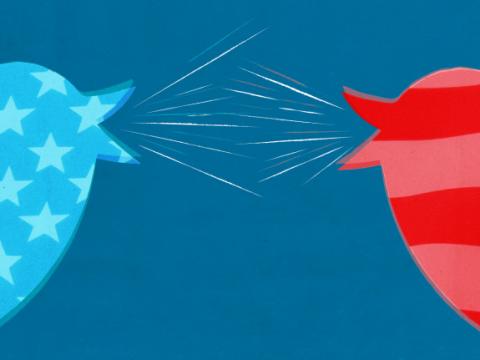Australian scientists say Twitter bots were highly influential during the first US Presidential debate

Via Business Insider
- Australian researchers, using new algorithms, find that Twitter bots had a large influence on the 2016 US Presidential debate.
- But the work doesn’t quite show that bots won Donald Trump the election.
- The ANU team analysed 6.4 million tweets over 90 minutes before, during and after the televised Presidential debate.
Did twitter bots win the US election for Donald Trump? We don’t know yet — but we do know that bots had a significant influence on the Presidential Debate.
Algorithms developed Australian computer experts have found that bots on Twitter were on average two-and-a-half times more influential than humans during the first US Presidential debate in 2016.
The researchers from the ANU Research School of Computer Science and School of Sociology also discovered there were far fewer bots than previously thought, but they had a disproportionate level of influence.
The team analysed 6.4 million tweets generated over the 90 minutes before, during and after the first televised Presidential debate between Hilary Clinton and Donald Trump on September 16, 2016.
They found bots were more politically engaged than humans and more likely to be pro-Republican.
The analysis showed “highly influential” human users, such as Oprah Winfrey, were more likely to be more pro-Democrat but a small percentage of mostly pro-Republican bots were more successful in influencing the Twitter information space during the debate.
The team co-led by Dr Timothy Graham and Dr Marian-Andrei Rizoiu spent months collecting data to determine if the 1.5 million user accounts active during the debate were actually humans or not.
They classified four categories: Bots (and bot-like), Humans, Deleted Accounts (more likely to be bots) and Protected Accounts (more likely to be humans).
Only 4.8% of the users were clearly bots.
“This figure was really underwhelming given we’ve seen other reports and studies claiming 20% to 30% of Twitter accounts were bots,” says Dr Graham.
“We suggest those figures were inflated by biases in the methodologies, which our work exposed.
“It startling to find those 4.8%of bots were on average two-and-a-half times more influential than humans.
“And because of the way bots, which we found were more pro-Republican, attach themselves to influential human users, they were more successful at getting real users to retweet and engage with their content.”
Some of the findings:
- Pro-Republican bots are twice as influential as pro-Democrat bots.
- Pro-Republican bots are more politically engaged than pro-Democrat bots.
- “Highly influential” bots are mostly pro-Republican.
- Many “highly influential” (human) users are pro-Democrat.
- Most pro-Republican (human) users are “mid-influential”.
The ANU team devised several algorithms and measures to better analyse the Twitter cascade effect which is not possible using data currently provided by Twitter.
“Previous studies tend to focus on the numbers of retweets provided by Twitter data, but what we are interested in is what – or who – makes a tweet go viral via cascades of retweets, and how much influence these actors have over the retweet cascades,” says Dr Graham.
“We devised an influence measure which we could apply over all the millions and millions of possible unfoldings of these retweet diffusions, as well as a separate measure of political polarisation and engagement which we used to determine the partisanship of a tweet.
“We live in really interesting times where information warfare is now the state of play for politics nationally and internationally, so more research like this can help us understand if democracies are functioning the way we intend.
“Of course our sample is very small, just 90 minutes of Twitter activity, and much greater-sized studies are required before we could determine if the aggregate meant that bots won Trump the election, for example. However, whilst it’s a small snapshot in time, the results are robust.”
The researchers say the tools invented by the team in the Research School of Computer Science accurately and more efficiently infer retweet cascades from Twitter data.
The study, #DebateNight: The Role and Influence of Socialbots on Twitter During the 1st 2016 U.S. Presidential Debate, is published in Proceedings of the 2018 International AAAI Conference on Web and Social Media.
